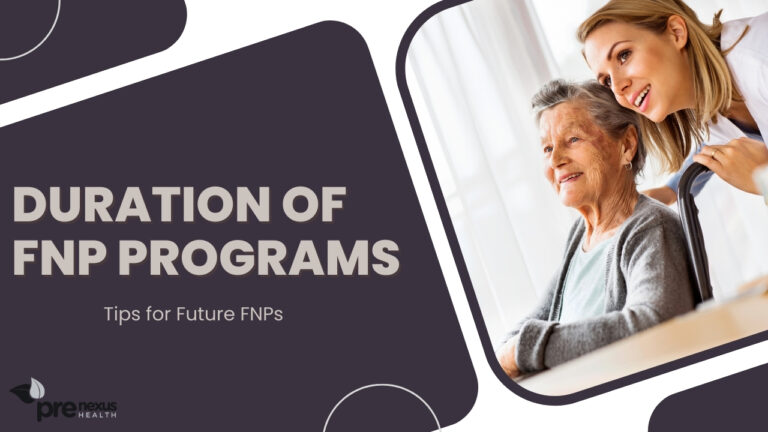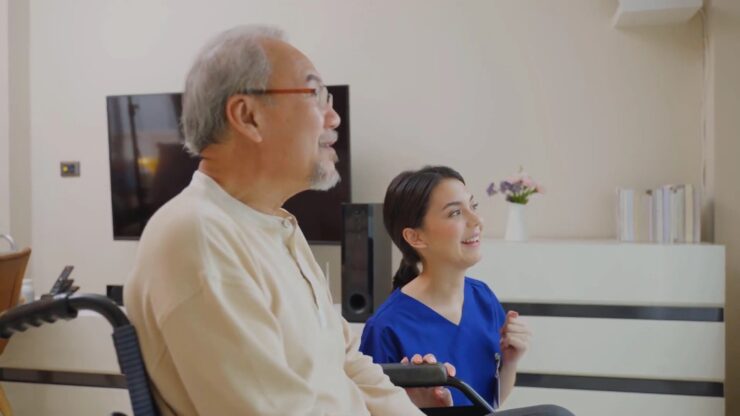Family Nurse Practitioner (FNP) applications are tailored for registered nurses aiming to make their exercise include greater autonomy and advanced patient care duties.
The duration of FNP programs usually varies primarily based on the instructional direction selected, encompassing graduate, postgraduate, or doctoral degrees, and whether or not the scholar is enrolled component-time or complete-time. Most programs, designed to deal with the running expert, offer flexibility in of entirety time.
A vital step in advancing to the position of an FNP is obtaining certification which means that the nurse possesses the necessary medical knowledge and abilities to offer a excessive trendy of care across a diverse affected person population.
Key takeaways
- FNP programs vary in length and can be completed between one to four years.
- Certification is required and involves passing an exam and continuous re-certification.
Different FNP programs
Becoming a Family Nurse Practitioner (FNP) involves complete training and rigorous schooling. This training pathway ensures that nurse practitioners are well-ready to offer number one care and advanced nursing offerings.
Essential education requirements
To input the FNP area, registered nurses should first obtain a Bachelor of Science in Nursing (BSN) diploma, followed by a Master of Science in Nursing (MSN) with a specialization in family nurse practice (MSN-FNP).
Some opt for a Doctor of Nursing Practice (DNP), the terminal scientific diploma for nurse practitioners, which prepares nurses for the highest stage of practice.
Accreditation of those programs by means of entities which include the Accreditation Commission for Education in Nursing (ACEN) or the Commission on Collegiate Nursing Education (CCNE) is essential to ensure fine training in line with industry standards.
Types of FNP programs available
There are numerous kinds of FNP packages. These typically require two to 3 years of full-time observation and include both coursework and medical exercise.
Designed for working nurses, online programs offer extra flexibility and might also be finished in two to a few years, although the timeline can enlarge if the nurse studies component-time.
For RNs looking to expedite their education, elevated applications allow for the entirety in a shorter time-frame, given an elevated course load and a more extensive agenda. These programs are tailor-made for nurses who’ve an associate degree or degree in nursing and want to pursue an MSN with out first obtaining a BSN.
These days, most programs come in the form of online courses. If you are interested in taking a look at one of these, visit onlinenursing.cn.edu.
Key skills and knowledge acquired
FNP schooling consists of middle lessons in superior pharmacology, advanced health evaluation, and superior pathophysiology to equip college students with comprehensive scientific understanding relevant across the lifespan.
Programs integrate specialized courses specializing in ailment prevention, fitness promotion, and the management of acute and chronic illnesses. Awareness and skillability in studies and proof-based practice are emphasized to make certain FNPs can seriously appraise and follow clinical evidence to their practice.
Clinical practicum and experience
Clinical schooling is a critical issue, in providing actual-world healthcare experience. FNPs spend a vast amount of medical practicum hours in diverse settings which include clinics, hospitals, and community fitness centers.
These placements facilitate the development of practical abilties and revel in, permitting students to manipulate patient care efficiently. Clinical experience is guided through skilled practitioners, further enhancing the educational system and making sure comprehensive education in patient-targeted care.
Certification and licensure
Family Nurse Practitioners (FNPs) need to meet rigorous certification and country licensure necessities to exercise. Certification as an FNP showcases scientific competence, while state licensure guarantees adherence to local regulations.
Qualifying for the FNP Certification
To qualify for the Family Nurse Practitioner (FNP) certification, applicants have to maintain energetic Registered Nurse (RN) licensure and a graduate degree, normally a Master of Science in Nursing (MSN) or a Doctor of Nursing Practice (DNP). These programs should encompass at least 500 hours of supervised medical paintings.
Exam Providers:
- American Nurses Credentialing Center (ANCC), offering the FNP-BC credential.
- American Association of Nurse Practitioners (AANP), providing an alternative certification.
Certification Steps:
- Complete an accredited FNP program: This education must cover family and individual care across the lifespan.
- Pass the national FNP certification exam: Required to validate your clinical knowledge and skills.
- Candidates must renew their FNP certification every five years to maintain validity.
State Licensure Requirements
Once certified, FNPs have to attain state licensure to legally practice of their nation of house. Licensure requirements can range but usually contain the subsequent:
Licensure Prerequisites:
- Active RN License: Unrestricted and legitimate inside the kingdom of exercise.
- Advanced Practice Registered Nurse (APRN) Accreditation: Earned thru completion of an authorized graduate-stage software.
Additional Criteria:
- Background Check: To make certain public protection.
- Continuing Education: Some states require extra training for license renewal.
FNPs may also be authorized to prescribe medicinal drugs when they acquire nation licensure, even though specific prescriptive authority can range by using state policy. It’s essential for FNPs to remain informed of the converting laws and policies that govern their licensure and exercise.
Career Outlook for FNPs
The profession landscape for Family Nurse Practitioners (FNPs) seems promising, characterized via strong process market call for and a strong capability for economic advancement.
Job Market and Demand
FNPs play a vital function in healthcare, regularly serving as primary care providers. The Bureau of Labor Statistics anticipates a 38% growth in employment for nurse practitioners, including FNPs, from 2021 to 2031, a price tons faster than the average for all occupations. This surge is partly driven by means of an getting older populace, an expanded cognizance on preventive care, and a developing health practitioner scarcity in primary care settings.
Earning Potential and Advancement
According to recent statistics, FNPs can anticipate a beneficial career, with average annual salaries of approximately $125,900.
This determine reflects the excessive call for for their services and the advanced talent degree associated with being an Advanced Practice Registered Nurse (APRN). Salaries can vary based totally on geographic location, years of revel in, and the particular healthcare settings in which they work.
Career development opportunities for FNPs may include management roles, instructional positions, and specialization in regions of excessive demand.
FAQs
How many years is nursing?
Nursing education typically involves obtaining a Bachelor of Science in Nursing (BSN), which takes about four years. However, for a Family Nurse Practitioner (FNP), additional education is required after the BSN, such as a Master’s of Science in Nursing (MSN) with an FNP specialty, usually taking an additional two to three years.
What type of NP makes the most money?
Among Nurse Practitioners, those working in specialties such as anesthesia and acute care tend to earn the highest salaries. The exact earnings can vary widely based on geographic location, years of experience, and the workplace setting.
What type of NP is most in-demand?
Family Nurse Practitioners (FNPs) are highly in demand due to their ability to provide comprehensive care across all age groups and settings. This demand is influenced by a growing emphasis on preventative care and the primary care provider shortage in many rural areas.
Which NP specialty is easiest?
The term “easiest” is subjective when it comes to specialties. Nurse Practitioner specialties vary in terms of complexity, intensity of care required, and patient acuity. Some may find specialties with more routine and predictable care, such as adult gerontology primary care, to be less intense compared to specialties like emergency or oncology nursing.
Summary
Family Nurse Practitioner (FNP) packages typically range in length primarily based totally on the instructional historical past of the pupil and the form of the program. Here’s a breakdown of the commonplace timelines:
Prospective FNP university college students should prepare for a extensive investment of time and assets. Tuition expenses, even as variable, frequently range from $15,000 to $100,000, depending closely on the organisation.
With willpower and cautious planning, pursuing an FNP certification may be a profitable enterprise, starting up doors to a number of opportunities in a topic experiencing growing name for.
I am a retired internal medicine physician named Dr. William Tousignant. With over three decades of experience in the field of geriatric care, I specialized in diagnosing and managing health issues among senior patients throughout my career.








